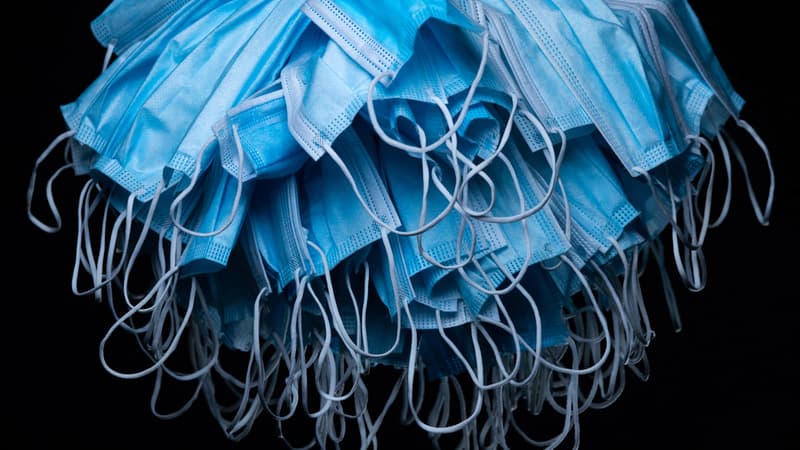The blues of “made in France” masks. Two years after being relaunched to great fanfare, the tricolor mask industry is experiencing a serious setback. To meet the exponential demand at a time when the virus was spreading throughout French territory, businessmen had embarked on the adventure, motivated by a proactive discourse from the State. In 2021 there were about thirty producers, capable of producing up to 100 million masks per week. But, since the lifting of the obligation to wear a mask last March, sales have plummeted.
“Demand fell almost day by day,” when Jean Castex announced the end of the mandatory use of masks, recalls Charlotte Zweibaum, quality manager and partner at KB Medica. The Sartrouville-based company in Yvelines only has one or two machines in permanent operation, compared to ten machines at the height of the pandemic. The squad has been divided into four since the beginning of the year, falling to less than ten people. “It’s hard to say what the next few months will look like,” she said.
In its facilities, the partners of the Ile-de-France company resumed their first activity, that of equipment rental for events, which had been paralyzed by the pandemic. For masks, it is committed to the same leg: in addition to individuals, whom it targets through online sales, the company designs personalized masks for companies and organizations. “But our model disappears if there is no longer a need for masks,” explains Charlotte Zweibaum, who believes that the sector should end up being concentrated in a few companies.
chinese imports
Also at Yvelines, Emmanuel Nizard has seen its volumes drop drastically in recent months. “Today we achieve 5% of the turnover that we made during the health crisis,” says the businessman, in charge of the “Masque français” in Vélizy-Villacoublay. “We have two options: either we close everything, or we try to keep a candle minimum”, and it is the second option “that we are trying to maintain at the moment”, he continues. The company tried unsuccessfully to supply hospitals but was unable to keep up with Chinese imports.
Franprotec, in the North, has opted for more efficient machines in Germany and Italy, capable of producing large series of masks, to reduce its production costs and its sale price at the end of the chain. “We are very clearly disappointed with the position of the State, which has promised many things, but we have never seen the color,” laments its leader, Pierre Winter, who regrets the slightest public requests. Once again, the latter points the finger at massive imports from Asia.
“We have launched a modern and efficient tool and created jobs”, but the State must “punch the table” so that they last over time, he testifies. The young boss from the north, however, remains optimistic and believes there is room for all French manufacturers. To buy its machines, the company has invested six million euros since the spring of 2020 in its Tourcoing factory. A strong investment, but essential to be able to fight on (almost) equal terms with China.
“They laughed at me”
In Brittany, these investments surpassed the “Cooperative of the masks”. Created under the statute of Cooperative Society of Collective Interest (SCIC, which associates communities, employees, associations, citizens and companies), the Masks Cooperative was placed in suspension of payments only thirteen months after the launch of the production. In addition to the drop in demand, the box was weighed down by an investment of 3.5 million euros in a machine to manufacture meltblown, the filter paper at the heart of the mask, because it was never put into production due to lack of buyers
The casts, the other nerves of war. Without it, there is no mask. The classic surgical mask consists of a layer of this filtering fabric surrounded by two layers of “spunbond”, with larger fibers and serving as a support. At the beginning of the pandemic, there was only one producer left in France: the government then launched a call for expressions of interest (AMI) for industrialists to encourage the reconstruction of a French sector. Ten projects, including Mask Coop, had been selected and subsidized up to 30% of their investment.
Meltblo France, in Franche-Comté, is one of these ten winners. “I had already thought about it before the health crisis. I was looking for investors, but nobody was interested, they laughed at me,” recalls its president Nicolás Burny. Four million euros were invested in the Brognard site, financed mainly by personal bank loans. From the beginning, he prepared for the end of the pandemic. The melt it produces is not only for masks, but for other filtration products as well.
electric bikes
“Now we are 90% dedicated to the mask and, little by little, we are starting to get out of it,” specifies Nicolas Burny, citing the automotive sector. The company, which has a dozen employees, has also hired two research and development engineers. It has developed a lighter fabric, 15 grams per square meter, instead of the 25 grams of market standards. It is sold a little more expensive, but the mask manufacturer does not need to buy as many: the cost price, in the end, is more interesting than the Asian meltblown.
At Vélizy-Villacoublay, Emmanuel Nizard is already on the move. His employees now also manufacture electric bicycles. The bike is designed at his facility, then assembled after receiving parts made elsewhere. “It’s a project that he already had in mind before, without the financial capacity to do it,” he says. His machines for making masks will soon be stored in a warehouse. “We don’t even try to sell them,” explains the French Mask boss, because “no one wants them.”
Source: BFM TV


